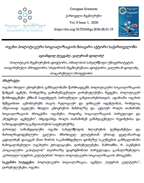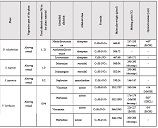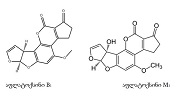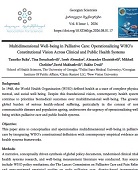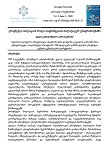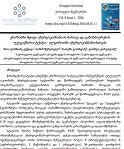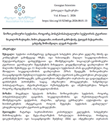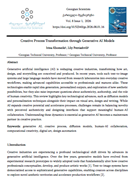Study of bioactive components and antioxidant activity of Kakhetian and European style wines produced from Georgian grape varieties
Downloads
In this work, the following biochemical parameters: tannins content (%), antioxidant activity mg /L-AAC-1, monomeric anthocyanins content and total polyphenols content mg/L GAE-1 in white wines 16 samples (Rkatsiteli, Msvane Kakhuri, Kisi, Khikhvi) obtained by European and Kakhetian method were studied to identify differences among variety and winemaking methods. The mentioned parameters range for tannin content from 0.067 to 0.155%, for total monomeric anthocyanin content :2.093-14.472 mg/L, for total polyphenol content 174.634-743.740 mg/L GAE-1, antioxidant activity 317.323 mg/L (AAE-1) in Kakhetian wines. While corresponding results 0.037-0.055%, 1.202-2.004 mg/L; 20.764-53.772 mg/L GAE-1; 130.702-367.935 mg/L AAC-1 are shown in European style wine. Based on the biochemical parameters of the wine, both European and Kakhetian style Kisi and Khikhvi are distinguished. A high positive correlation was observed between total polyphenol content and antioxidant activity (r2 = 0.934). However, the highest was determined in tannins-antioxidant activity and tannins-total polyphenol content (r2 = 0.957). A relatively weak correlation was found between total monomeric anthocyanin content and the antioxidant activity (r2 = 0.767) and total monomeric anthocyanin -total polyphenols (r2 = 0.767).
Downloads
Castaldo, L., Narváez, A., Izzo, L., Graziani, G., Gaspari, A., Minno, G. D., & Ritieni, A. (2019). Red Wine Consumption and Cardiovascular Health. Molecules (Basel, Switzerland), 24(19), E3626. https://doi.org/10.3390/molecules24193626
Pang, G., Xie, J., Chen, Q., & Hu, Z. (2012). How functional foods play critical roles in human health. Food Science and Human Wellness, 1(1), 26–60. https://doi.org/10.1016/j.fshw.2012.10.001
Morata, A., & Loira, I. (2016). Grape and Wine Biotechnology. BoD – Books on Demand.
Reynolds, A. G. (2010). 11 - Viticultural and vineyard management practices and their effects on grape and wine quality. In A. G. Reynolds (Ed.), Managing Wine Quality (pp. 365–444). Woodhead Publishing. https://doi.org/10.1533/9781845699284.3.365
Capece, A., Siesto, G., Poeta, C., Pietrafesa, R., & Romano, P. (2013). Indigenous yeast population from Georgian aged wines produced by traditional “Kakhetian” method. Food Microbiology, 36(2), 447–455. https://doi.org/10.1016/j.fm.2013.07.008
Luna-Guevara, Ma. L., Luna-Guevara, J. J., Hernández-Carranza, P., Ruíz-Espinosa, H., & Ochoa-Velasco, C. E. (2018). Chapter 3 - Phenolic Compounds: A Good Choice Against Chronic Degenerative Diseases. In Atta-ur-Rahman (Ed.), Studies in Natural Products Chemistry (Vol. 59, pp. 79–108). Elsevier. https://doi.org/10.1016/B978-0-444-64179-3.00003-7
Merkytė, V., Longo, E., Windisch, G., & Boselli, E. (2020). Phenolic Compounds as Markers of Wine Quality and Authenticity. Foods, 9(12), 1785.
Determination of Tannins and Sulfur Dioxide Content of Different Wine Samples by Titrimetric Method. (2016). Chemical Science Transactions, 5(2).
Benzie, I. F., & Strain, J. J. (1996). The ferric reducing ability of plasma (FRAP) as a measure of “antioxidant power”: the FRAP assay. Analytical Biochemistry, 239(1), 70–76.
Singleton, V. L., Orthofer, R., & Lamuela-Raventós, R. M. (1999). [14] Analysis of total phenols and other oxidation substrates and antioxidants by means of folin-ciocalteu reagent. In Methods in Enzymology (Vol. 299, pp. 152–178). Academic Press.
Wrolstad, R. E., Acree, T. E., Decker, E. A., Penner, M. H., Reid, D. S., Schwartz, S. J., … Sporns, P. (2005). Handbook of food analytical chemistry: pigments, colorants, flavors, texture, and bioactive food components. Handbook of food analytical chemistry: pigments, colorants, flavors, texture, and bioactive food components.
Foods | Free Full-Text | Comprehensive Chemical and Sensory Assessment of Wines Made from White Grapes of Vitis vinifera Cultivars Albillo Dorado and Montonera del Casar: A Comparative Study with Airén. (n.d.). Retrieved January 29
census - ნაწილი 3. მრავალწლოვანი ნარგავები. (n.d.). Retrieved January 30, 2022, from http://census.ge/ge/results/agro-census/meurneobebis-ganatsileba-sargeblobashi-arsebuli-mitsis-fartobis-mikhedvit-ბოლოს გადამოწმდა 02.02.2022
Paixão, N., Perestrelo, R., Marques, J. C., & Câmara, J. S. (2007). Relationship between antioxidant capacity and total phenolic content of red, rosé and white wines. Food Chemistry, 105(1), 204–214.
Bendary, E., Francis, R. R., Ali, H. M. G., Sarwat, M. I., & El Hady, S. (2013). Antioxidant and structure–activity relationships (SARs) of some phenolic and anilines compounds. Annals of Agricultural Sciences, 58(2), 173–181.

This work is licensed under a Creative Commons Attribution-NonCommercial-NoDerivatives 4.0 International License.











